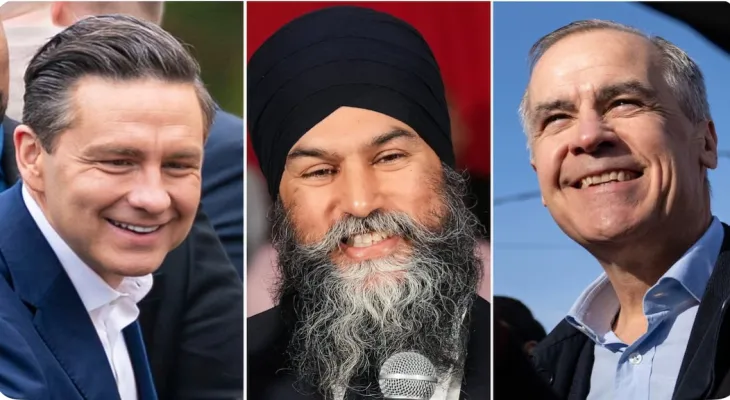Search here
Newspaper
Search here

Arab Canada News
News

Published: April 23, 2025
Toronto – Arab Canada News
As the final days of the federal election campaign continue, both Liberal Party leader Mark Carney and New Democratic Party leader Jagmeet Singh intensified their attacks against Conservative leader Pierre Poilievre, following the revelation of details about the Conservatives’ officially funded election program.
Carney stated during a press conference held in Calgary that Poilievre's plan “lacks seriousness and does not address the economic challenges facing the country,” pointing out that the Conservative program lacks clear answers on how to fund the proposed tax cuts. He added, “Running a country's economy is not like running a YouTube channel.”
For his part, Jagmeet Singh described the Conservative plan as a “gift for the rich at the expense of Canadian families,” noting that the program does not provide real support for healthcare or tackling the housing crisis, affirming that his party will continue to push for the protection of public services and increased taxes on the wealthy and large corporations.
In contrast, Poilievre defended his program, asserting that his plan aims to “reduce costs, create jobs, and free the economy from bureaucracy,” and considered that the criticisms from his opponents reflect “their fear of real change.”
A record in early voting
On another note, Elections Canada announced that more than 7 million Canadians cast their votes during the four days of early voting, a new record compared to previous elections. This notable turnout comes amid sharp political polarization and a narrowing gap between the two main parties in opinion polls.
With less than a week remaining until the federal election scheduled for April 28, competition intensifies in many crucial electoral districts, as parties focus their efforts on persuading undecided voters and enhancing voter turnout.
Anticipation and political mobilization
Recent Nanos polls indicate that the Liberals are ahead of the Conservatives by about 6 to 8 percentage points, but analysts warn that the scene remains subject to change, especially with the shifting public mood in light of pressing issues such as inflation, tariff policies, and trade threats from the United States.
All eyes are on the final debates and the intense field activities carried out by leaders in the critical days leading up to the official voting, amid a heightened state of alert among federal parties.
Comments